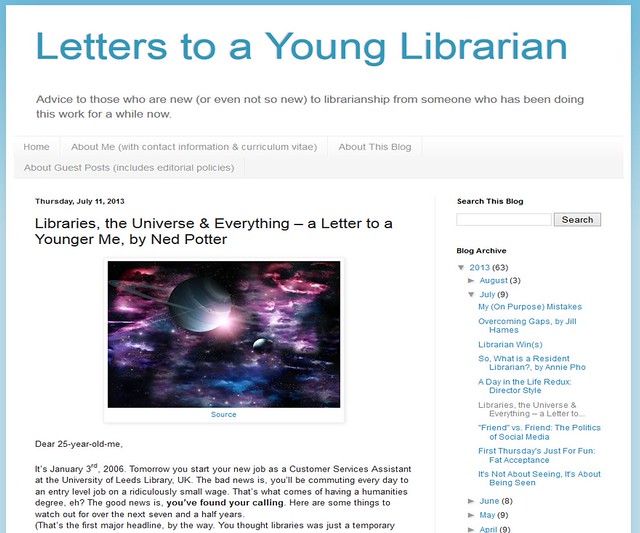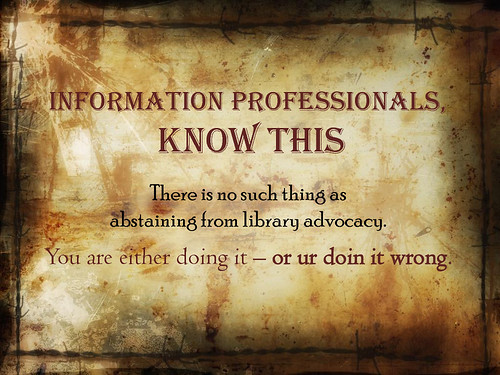
In a way this is slightly off-topic in that it isn't about libraries, but in more ways it's on-topic because this blog is often about new technology, and social media, and higher education. In particular I think we as information professionals should be sharing our expertise in social media with the academic community - I do this via workshops, and one question I get asked in more than half the sessions I do, is, how do you deal with the unpleasant attention online which you (inevitably) get if you are both prominent and female?
When I was first asked this I really didn't know how to answer it very well - the second and subsequent times I'd looked into it a bit and felt better prepared, but there still doesn't really seem to be a good answer (outside of: Fix Society - which I'm not holding my breath for). With this in mind, I went along to a session called Female public intellectuals - the risk of exposure as part of the University of York's Intellectual Integrity conference. The panel discussion was revealing, fascinating, and depressing - I was going to say in equal parts but that's glib; it was basically mostly depressing. Here are some thoughts around this whole issue, for what they're worth.
The problem
I'm sure we're all familiar with the problem but let me set it out explicitly here: the problem is that as soon as you gain an amount of exposure, you open yourself to abuse. I think this is true across the board, because among every X number of people, a small percentage of them are bound to be fecking idiots: the higher the number X, the more idiots are in that number. However the problem of abuse is exacerbated by the internet in general (it allows disconnected contact in a fashion which allows cowards to flourish), social media in particular (it allows direct access and potentially even the feeling that you 'know' someone and so are entitled to comment on their appearance, etc) and is much much worse if you're female, gay, or in an ethnic minority.
Increasingly vital to researchers and academics is the need to have impact, and to have impact you need to be seen. To be seen is to open yourself to abuse, so how do you do your job in such conditions?
One of the panel spoke about how she appeared on the BBC for around 2 minutes - TWO MINUTES - and within hours had several emails from people either saying how sexually UNattractive they found her, or how sexually attractive they found her and what they wanted to do about it. Males on the same programme got emails too - about their arguments. But she just basically got abuse - and keep in mind, this is a BBC1 audience who had to Google her and find out her email, and took the time to do so.
The two things that really hit home for me attending this talk (and keep in mind I'm a social-media-workshop-teaching, feminist-lefty-leaning Guardian-reading, already-interested and somewhat-read-up-on-this librarian...) were A: how little exposure women need to get abuse (I naively thought it didn't happen until you'd been on TV, but people with 2,000 Twitter followers are finding that enough to warrant emails detailing sexual fantasies) and B: how there's no real preparation for dealing with it. It's not really discussed much. There's a tendency to laugh it off or, worse, to feel misplaced guilt about it - maybe I inadvertently led them on? So it doesn't get shared, and you don't get the relief and understanding that comes from realising other people are getting this abuse too, and it's not your fault.
We're not talking about a tiny number of 'sick' people abusing women online anymore. It's really, really common.
It's no longer about anonymity
For ages I thought the problem with the internet was anonymity. If you want to see how people act when they're unaccountable, go look at the comments section of ANYTHING - YouTube, the Guardian, heaven forbid the Mail - and check your faith in humanity at the door. People say awful things, all the time, because they don't have to take responsibility for them - they can hide behind a random username.
But I don't think that's even the main issue anymore. Take a moment to look at this tumblr post from Feminist Frequency - she had the audacity to tweet a mild comment about lack of female lead characters in computer games, and got back an unfathomable stream of abuse. The abuse is not from people hiding behind the anonymity of the net. It is from people with their name and photo on their twitter account.
Another attendee at the session today mentioned the 'coarsening of society' - we are generally getting more unpleasant, more mysognistic all the time. I agree with that, but I think social media can make this a lot worse because of its unique ability to connect like-minded people.
Social media, tribes, and 'finding your (similarly repulsive) people'
I love social media. I love most how it can help you find your people - you can reach all the other Twitter users who happen to have your exact outlook on life, or taste in music, or professional interests, or whatever it might be. It gives us all the chance to deepen and enrich our experiences through sharing them with the like-minded. The old saying about how you can't choose your family, but at least you can choose your friends - that needs updating. Because even your friends are chosen partly based on logistics such as geography, place of work etc. Online you can find people just like you!
However... There's a darker side to this, which is that all the really repulsive people can find all the other really repulsive people. And what they do (this is my pet theory; others may have explored this with proper intellectual rigour) is form their own ersatz society, which comes with different standards of behaviour. It seems to me that a depressingly high percentage of humans really have no private morality at all - the only reason they aren't unpleasant to women (for example) all the time is because society's norms dictate that they can't. Hence, the original problem of anonymity and the net - if you're not accountable to society's norms you can finally act however you like (which for lots of people seems to be: Really Unpleasant!). But now that all these people can find their tribes online, they effectively create a new society where the norms ARE to be unpleasant and misogynistic - so they think nothing of abusing prominent women under their own name and their own image.
God it's depressing.
A project to tackle this
I'd like to see Higher Education Institutions tackling this by preparing academics and researchers (both male and female) for what will happen if they become prominent. I'd like to see students being taught about the scale of the problem as soon as they engage with the online world. Clearly this is a far bigger problem than just an academic one, but we can't all leave it for someone else to fix society. But even tackling this problem head-on is fraught with difficulty - as someone on the panel pointed out, this has the feeling of acceptance: getting abuse is part of being a successful female, so here's some coping strategies, off you go.
Anyhow there is work being done in this area, and I particularly wanted to highlight what Sara Perry, one of the panelists, is doing at the moment. She's collecting data about people's online experiences, and there's been around 200 responses to her survey so far (which is great as it's brand new) - including people saying how they deal with this and offering SOLUTIONS or at least ways of getting through the problem for individuals. That's a great thing, and I can't wait to see what Sara and her team publish at the end of it. (From a purely selfish point of view, I'd like to be able to better advise people who ask me about this in social media workshops about how to deal with it.) So please consider taking the survey - the details and the link are on Sara's blog. Sara is speaking up about really problematic issues here in the hope that it can help others who have endured similar incidents to those she's experienced, which is vital.
If anyone has anything they'd like to add to this in the comments, whether it's general discussion or advice on how to deal with online abuse, please leave a comment below. And if you've made it this far, thanks for reading!





